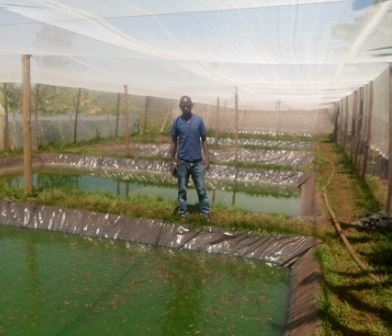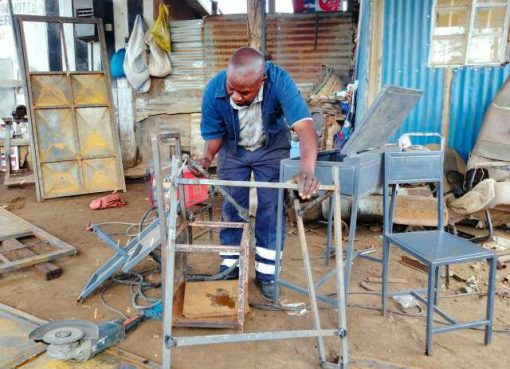Jeremiah Makimi ventured into fish rearing two years ago and has been making a fortune out of it.
Speaking to KNA in his home in Sagana, he admits it was not easy starting out fish farming because aquaculture is not popular in Central Kenya but with resilience and a few false starts, he has managed to carve a niche for himself.
“I started with constructing two ponds in our half acre piece of land, which I stocked with 2000 fingerlings of catfish in each pond,” said Makimi
He notes that despite there being adequate water masses in Central, fish farming remains unexploited as many shy away from the venture due to high start-up capital as Makimi elaborates.
“I constructed two ponds, each measuring 8m by 10m and purchased fish nets to keep predators like birds and other animals away,” he notes. The Construction and stocking with fingerlings cost the Makimi close to Sh. 200,000
“I sourced 4000 fingerlings from a fellow farmer at a cost of Sh. 10 per fingerling,” observed Makimi.
The fish farmer adds that with time they diversified to other species of fish and currently they have five ponds each containing different species of fish.
“I rear tilapia, catfish and other ornamental fish that are doing very well in this cool climatic condition” he pointed out
Normally, the fingerlings are stocked at three weeks and are mature to sell at 8 months. He says adding that farmers need to be careful and know when the fish mature because fish eat each other. The fish are fed twice a day, with worms, waste feeds and artificial feeds. Together with his wife Jane, Makimi runs an exclusive fish restaurant that serves local community.
In addition to the restaurant, Makimi sells his fish to suppliers and other buyers in Kirinyaga and Murang’a.
“I make a profit of sh.100 per kilo of fish and per harvest I’m able to make a profit of Sh. 40,000 and I can harvest up to 500 Kgs,” he expounded
He mentors other farmers who want to venture into fish farming and together they have formed a group of 40 members.
“I have offered mentorship to around 40 farmers who have all started their own fish ponds” confirms Makimi adding that aquaculture is profitable if one has his own land and fresh source of water.
“I would encourage more people to venture into it, as there is a lot of unexploited potential since the demand is high”
However, like any other venture, as Makimi says, fish farming has its fair share of challenges. He observes that disposal of fish water due to pollution is one of the challenges farmers have to grapple with. He also notes that sometimes there is shortage of water, and that the feeds too are expensive.
By Florence Kinyua and Bernard Munyao




